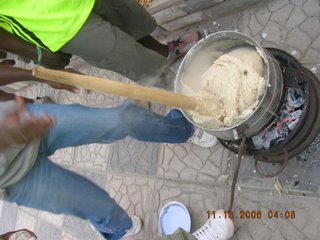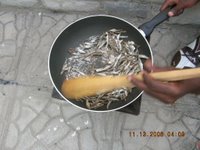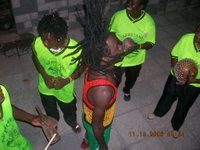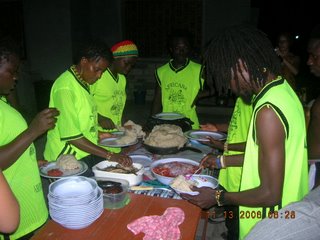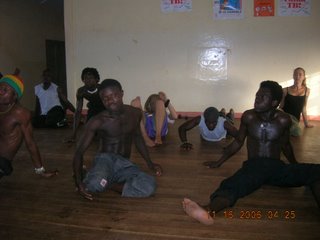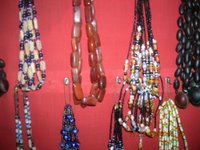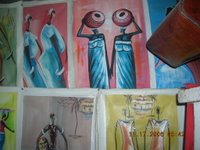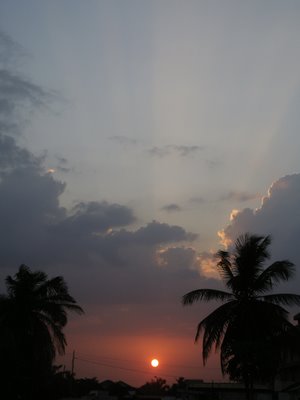Follow-up, profiles:
Kim, the ill-fated Dutch girl, was robbed again on the very night I wrote the entry about her. She was walking home from the dance rehearsal where she had told me the story of her ghastly week. This time she was escorted by Jimmy, one of the Africana dancers. He’s a pretty substantial guy—tall, lithe, and muscular. As they were walking along the road, a motorbike with two riders sped up from behind them. The passenger jumped off, brandished a “cutlass” (a long machete, I presume), and beat Kim and Jimmy with the flat side of the blade. Once they were both on the ground, he relieved Kim of her bag. This time there would be no catching or identifying the thieves, since they were mobile and wore full motorcycle helmets that obscured their faces.
When Kim returned to her host-family’s house in tears, they inexplicably erupted into laughter at her misfortune. Then, after Jimmy left, they reproached her for hanging out with “dirty Rastas” like him and said that her association with them was likely the source of all her recent troubles. They also told Kim that their own daughter had been accosted on her way home from school that day; that, too, they felt, was a result of Kim’s friendships with the dreadlocked Africana dancers. They angrily admonished her for putting their family in danger and advised her to shape up.
So she did, by moving out the very next day. But what next? The Dutch volunteer company that “arranged” her visit (i.e. set her up with a bogus, corrupt Ghanaian NGO that she quit after a couple months to volunteer in an orphanage for spastics and epileptics) has been no help. Not that they helped her to find the host family in the first place. But now she is searching for a room in a safe part of town, with a GHC 2,000,000 (approx $225) monthly budget. That’s GHC 2,000,000 for everything—room, board, and transportation. Even here in the land of ramshackle rentals and cheap, tasteless stomach-fillers, that’s a tough nut to crack.
So Kim is holding out, searching, keeping her chin up as much as possible, and hoping for the best. If she can’t find a place in the next week or so, she may return to Holland. So much for good intentions—maybe Kim’s example underscores the necessity for contingency plans, etc; but how could one prepare for such a wretched string of events? It doesn’t seem fair that such a well-meaning soul can’t be accommodated here. Hell, her idea of a good day’s work is strapping a little girl to a board for ten excruciating minutes to train her spastic muscles so she can eventually stand—maybe. Can you imagine?
Sometimes you can look to the Good Book for the Bad News: the rain falls on the just and the unjust alike.
Yesterday I spoke to Peter (the man with dreams of real estate speculation and a special love for Psalm 37) for the first time in a couple weeks. He has not yet visited the banks I told him about because he has been busy preparing to open his roadside snack bar. Apparently he has been traveling to Kumasi on supply runs. He expects to open up in a couple more weeks, and he assured me that he would call to let me know when exactly he fries his first spring roll. I’ve insisted that I want to be his first customer. But yesterday when we talked on the phone he told me that when he woke up his neck hurt (“from sleeping”), and so that was slowing him down for the day. He sounded sedate, like the second time I went to visit him. I hope it’s just stiff from hard work.
Other characters who live here:
Sarah is a large Ghanaian woman in her mid-twenties. She works in the Corporate Planning division of Opportunity International and her desk is close to mine. She is kind and serene, smiles an easy smile, laughs a lazy laugh, and calls me her “white boyfriend”. Her eyes are clear and bright in her wide, full face. I’ve never heard her raise her voice.
Every morning at 8am there is a mass exodus from the third floor office (where I work) to the banking hall on the ground floor for Morning Devotion. Virtually every employee attends every morning, and most are in the office before 8, so they leave their desks to go downstairs. But Sarah stays and reads her own small, plain-black-leather-bound, soft-worn Bible at her desk. The other day I asked her why she doesn’t go down with the others. She said, “I don’t want to walk all the way down and back up. So I just read my Bible here. Besides, I already have a Morning Devotion at home.”
She went on to explain that her father, a pastor, wakes the family at 4:30 every morning so they can worship together. Their family service consists of some group prayer, a song or two, and preaching. When they finish, a few minutes before 5, those who don’t yet have to prepare for work go back to sleep; but Sarah does some housework and chores until 6, when she leaves for the office. They used to have an afternoon devotion as well, when everyone returned from work, but her father stopped giving it due to lack of attendance.
“Why so early?” I asked. Sarah explained that some of her siblings leave for work as early as 5; and by that time they need to have had their daily dose of praise, worship, and thanksgiving.
“Don’t you have a time each morning when you thank God for your family, your friends, thank God that you are breathing, thank Him for all He has given you?” she asked, almost rhetorically, as if I didn’t have to answer whether or not, but when and where. When I told her that my Morning Devotion didn’t involve God, but only some meditation and yoga, she didn’t miss a beat. She just continued discussing her own practice, her own routine, and the beliefs of her church (Spoken Word denomination) calmly and matter-of-factly. She was not actively proselytizing, but rather spoke as if her subject was so true and universally-accepted that it had a gravity all its own. It was as if she only needed to present it—the persuasion would follow naturally.
So, for about 15 minutes, she led me on a meandering walk through her—and her church’s—beliefs, and the attitudes and actions that grew organically out of them. She touched everything from wardrobe to interpersonal relations. Two of my favorite quotes are below:
“Each morning I give thanks for my enemies as well as for my friends, and I pray to God that I can influence their lives in a good way.”
“It’s so hard to be angry—you have to work and work at it. But it’s so easy to be happy. You don’t have to do anything. God made us to be happy.”
Would that everyone, Christian or otherwise, build a life on these foundations! But Sarah said the above with such effortless sincerity—maybe even innocence—that I had to wonder whether they had ever been put to the test. What if she had been in Kim’s shoes the past week? That said, who am I to judge? A beautiful attitude is not something to be criticized, even if it is something to be understood in context.
Whatever the case may be, Sarah is a joy to work with and is almost Buddha-like in her tranquil demeanor and essentially good nature. If it comes easily to her, all the better.
From a different camp we have George, one of the National Service Personnel who helped with the arduous process of defining clusters of businesses. He is skinny, with rather thin lips and bright white teeth. He wears glasses. George is a nerd in the most complimentary sense of the word: inquisitive, excitable, opinionated, and friendly. Most of his clothes look big on him and he has a jaunty, duck-footed walk. He doesn’t drink, but he loves to dance (“boogie”). He speaks in quick, concentrated packets and tends to swallow the last letter of each word—somehow in its intonation, diction, and enunciation, his English sounds like that of a native Chinese.
George has “big plans”, and he’s chomping at the bit to get them started. He has a scheme to sell home construction materials, a plan for an herbal mouthwash product, and a secondary degree in mind. Only thing is, his National Service at OI is taking up all his time. He’s not very happy about it; but he tries not to let it get in the way. When work is done, he rarely hangs around to socialize, and sets out quickly for home.
And home for George is a very large—and very unfinished—house on the outskirts of Accra, ten-minutes’ walk from any paved road. The first floor has windows and doors installed. Inside there are nice floors of shiny dark tile, gaping holes in walls with gnarled nests of wires hanging out, well-appointed bathrooms (some with bidets!), water-damaged walls and warped, leaning bookshelves, nice mouldings on some ceilings, and bags of cement stacked in unused corners. George’s bedroom gives the distinct impression that he’s squatting: he has a mattress on the floor with a crumpled sheet kicked to the corner, a coat rack which holds his entire wardrobe, a television and radio set on boxes, and a pile of things too various to describe. It’s the kind of random assortment that cannot be willfully constructed, but must be accumulated over time. When I went to enter, he warned me, “It’s very dirty in there. I have not swept in a long time.”
Why is George living alone in a large house under construction? The Ghanaian standard is to live with one’s parents until one gets married and begins his own family. But George never had the standard set-up: his parents separated when he was very young and he grew up in his father’s house, meeting his mother for the first time when he was seventeen. Although he has eight half-siblings, he considers himself an only child. Just before he first met his mother he had a falling out with his father, who disapproved of his taste in churches and in universities (George wanted to go to a private school). Eventually he presented George with an ultimatum: toe the family line, or go it alone. So George chose the latter and applied to his uncle for help with school tuition. Instead of paying the expensive housing fees he directed his nephew to his slowly-emerging house in the sticks; and George has been there ever since.
In a culture where devotion to family is absolutely paramount, where household chores are done daily and with mind-numbing consistency, where the universe of most upwardly-mobile young adults is like a sparse and tidy cloister, George’s is like, well, a rambling, messy, half-finished secondhand mansion in the sticks.
Beyond his business plans, there are family plans; these we discussed in the cavernous living room of his uncle’s house last night. One more thing about George’s diction is that he says “develop” whenever he means “work on,” “improve,” “invest in,” “create,” “modify,” etc. Maybe it’s a symptom of his entrepreneurial spirit. Anyway, he has been “developing” a girlfriend: a Ghanaian-born girl who has lived in the Netherlands the past 15 years. He knows her from the times she has come back to visit. And he knows that she is a hard target, surrounded as she is by the glitz, glam, and wealthy suitors of Europe. But he has made his intentions clear to her and is convinced that he has only to demonstrate that he is responsible and independent; that he can provide for (George said “manage”) her.
His thoughts on independence: “If you can make food for yourself, have a place to stay, have a car—what again can you want on this earth? Nothing again.”
So what do we make of George? He has big plans for the future but decidedly ordinary desires in the long run. He is always presentable and well-dressed but his room is a mess. Hell, he wants to marry a Dutch Ghanaian. He has broken the mold! Where others look straight ahead, he can’t help but look around. Thus, even if he chooses to walk the same path with them, he does so willfully and deliberately. In Dark Star Safari, Paul Theroux writes that most Africans “lived their lives with a fatalistic patience.” Sarah does; but George doesn’t. I think that Ghana needs a dash of that impatience, that willingness to jump off the lumbering status quo and check out something different, even if only briefly. How else can change come about?
Anyway, now you know Sarah and George; and hopefully you send your best vibes to Kim. I’m thinking of all of you…I hope everyone is well! Much love, Jake.

